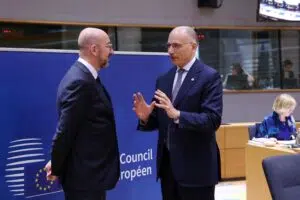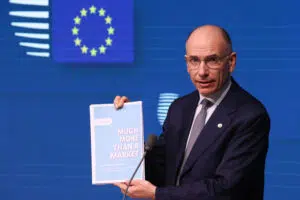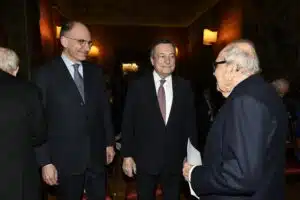Brussels – A full day’s discussion, which started with a two-hour exchange with Erico Letta on the future of the Single Market and continued with a thornier-than-expected confrontation among EU leaders on the foundations on which to base the competitiveness of the future. The extraordinary European Council today (April 18) approved the last conclusions left on the table—not without effort and with the text amended twice—about the Union’s economy and competitiveness, resting the first bases of a path that from Letta’s report will lead to that of another former Italian Prime Minister, Mario Draghi, to define a new Pact for European Competitiveness.

It all started with the report presented by Letta and already broadly outlined on the eve of the EU leaders’ summit. “It is a set of tools to choose from, not a bible; some can be used right away, others will need many months,” explained the Italian ex-premier, explaining that “we have to run and close the gap on many aspects, especially with the United States” in a world “different from the one in which the Single Market was conceived and created; there are new needs.” Regarding the report’s proposals, Letta called them “pragmatic and realistic,” and they do not include changing the EU Treaties: “Today it would mean not being concrete and not having immediate effects, although I am not saying that it would not be desirable. As for the next steps in the report, the Belgian Prime Minister and rotating President of the EU Council, Alexander De Croo, disclosed that he has spoken with the incoming Hungarian rotating presidency, “and they are very pleased with the work we have done on competitiveness.” Starting July 1, Budapest will have to lead the work to “make sure that our companies also have the resources” to ensure that “the green transition can be achieved.”
Building on the lines drawn by the Letta report, the 27 heads of state and government deepened their discussion for another five hours on the directions of European competitiveness in the future. “A new European Competitiveness Pact is needed, anchored in a fully integrated Single Market,” reads the text validated by EU leaders, which emphasises “efforts at both the Union and Member State level and across policy areas to close the gaps in growth, productivity, and innovation between the Union and its international partners and main competitors.” The goal is to “act decisively to ensure long-term competitiveness, prosperity, and leadership on the global stage and to strengthen strategic sovereignty.” The passage about the Capital Markets Union is particularly relevant in this context, as it is one of the most closely watched instruments (including by the Letta and the upcoming Draghi reports) for financing the green and digital transition. It mentions work on “all identified measures that are needed to create truly integrated European capital markets accessible to all citizens and businesses in the Union,” including by improving “supervisory convergence and efficiency” on the “most systemically relevant” cross-border actors.

The head of the report on the future of the Single Market, Enrico Letta (April 18, 2024)
“Capital Markets Union is our European Inflation Reduction Act,” claimed the President of the European Council, Charles Michel, recalling that “the EU has €33 trillion of private savings; we need to find ways to channel them into our businesses.” And about the comparison with Washington, “European start-ups receive less than half the funding of those in the United States, this situation must change,” is the appeal of Michel, who confessed how “it was a difficult European Council, but we made progress in developing the EU’s industrial strategy.” Words confirmed by the president of the European Commission, Ursula von der Leyen: “Letta said it all in his report, private funds are not fueling the development of our companies in the EU because of the fragmentation of capital markets,” but today’s conclusions on competitiveness represent “an important push to move forward and focus on a common European framework that adds value, reduces costs, and facilitates access to capital.”
Reactions to the Letta report and the future of competitiveness
“I welcome Letta’s report on how to strengthen and modernise the EU’s best asset, the Single Market,” commented on X the Commissioner for Cohesion and Reforms, Elisa Ferreira, recalling the importance of cohesion policy in “ensuring that the benefits for the Single Market are spread throughout the EU” to promote “a level playing field.” More cautious is her colleague in charge of competition and Executive Vice President of the EU Commission, Margrethe Vestager, who shut the door at a possible revision of the EU merger rules, an implicit suggestion from the Letta report about the need to catch up with U.S. and Chinese competitors in the race for new green and digital technologies: “The Merger Regulation serves businesses, consumers, and the European economy as a whole very well; it has protected competition in the Single Market and, in doing so, kept markets fair and contestable.” Italy’s Prime Minister, Giorgia Meloni, was keen to point out that “there are many insights that are also inspired by the Italian example.”
The Belgian premier and rotating president of the EU Council wanted to thank the Italian ex-premier for “the excellent work,” although “I don’t necessarily agree on everything.” In any case, for De Croo it is a report that is “very pragmatic and touches on the right elements,” such as how to “mobilise the gigantic amounts of savings we have in Europe to finance the energy and green transition.” However, the idea of the Capital Markets Union raises the “concerns” of some member countries, particularly “about the centralisation of supervisory functions and the system of taxation to companies,” as made clear by the Irish Taoiseach, Simon Harris. “We know what we have to do; the Single Market works for goods, but it doesn’t work for services, and this is not good,” warned Estonia’s prime minister, Kaja Kallas, instead. On the part of the Spanish premier, Pedro Sánchez, for Madrid, “the most relevant thing is to continue to leverage private investment through the investment of public resources,” with the possibility of “channelling private investment through the European Capital Market, but also having new funds such as the Next Generation Eu after 2026.”
From Letta’s report to Draghi’s one
What began today is a journey that will be marked by three moments: the report on the future of the Single Market, the definition of the Strategic Agenda 2024-2029 and finally, Draghi’s report on the future of European competitiveness. In Brussels, many sources point out that the appointment with the former European Central Bank governor to present the report has not yet been formalised, but it will be, in any case, after the June 6-9 European elections, thus at the earliest at the June 27-28 EU leaders’ summit. “What I will propose is a radical change: that’s what we need,” Draghi anticipated for the first time in his speech at the High-Level Conference on the European pillar of social rights on April 16.

From left: former Italian Prime Ministers Enrico Letta and Mario Draghi, respectively, responsible for the high-level report on the future of the Single Market and the report on the future of European competitiveness
Just on the eve of the European Council, Draghi set forth the broad outlines on which work on the report on the future of European competitiveness is being set: “We focus on ten macro areas of the European economy” with “three common threads,” namely scalability, public goods and the supply of essential resources. There are many points of contact with the report presented today by Letta to the 27 EU leaders, particularly on transition financing instruments, and both Italian ex-premiers confirmed that they had worked in synergy in preparing their respective reports. Everything points to a convergence of the two texts not only in the Strategic Agenda for the next legislature but especially in what will be the pillars of the next multi-year EU budget (2028-2034), given the fact that sources report “a concrete opportunity” to create a stable base for discussion on the goals and priorities for the long-term future of the entire Union.
English version by the Translation Service of Withub








